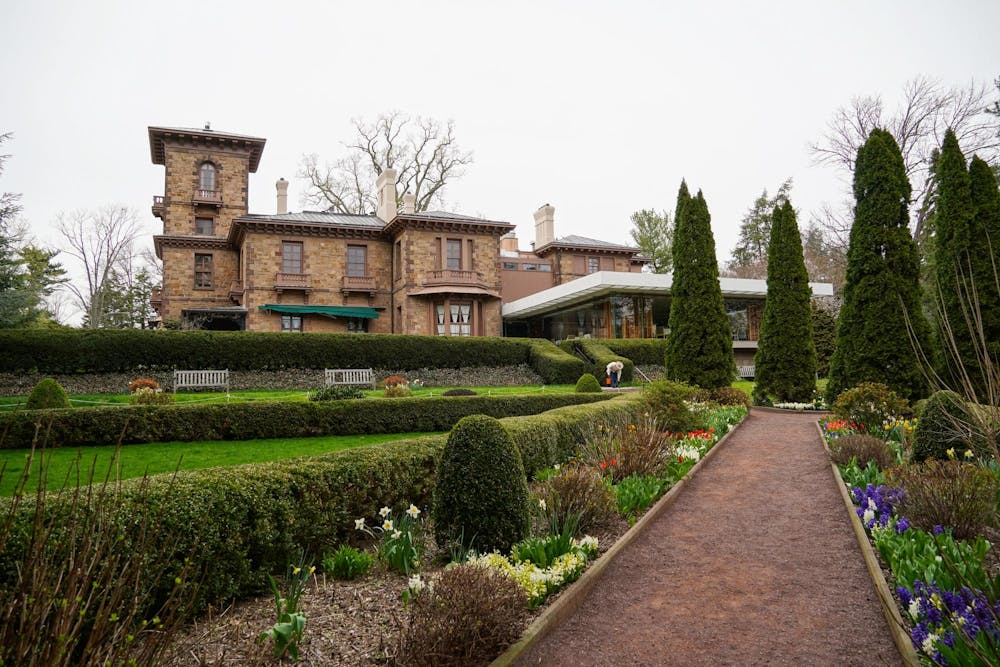A spotlight illuminates you from the ceiling, sending a blinding glare off your metal bowl. Other tables fall silent, entire athletic teams swivel around to stare, and you are ultimately dragged from the hall with a shepherd’s hook. That was the image that came to mind when a friend told me, after our first week, that they were scared to eat alone in the dining hall. Solitude at Princeton triggers fears of judgment and exclusion from the community, powerful enough to manifest directly upon arrival on campus. Princeton students learn immediately to avoid spending restorative time alone, instead deflecting our anxieties outward.
There is a powerful human instinct to avoid solitude. In a study conducted by the University of Virginia, psychologists found that two-thirds of men and one-quarter of women chose to administer themselves an electric shock rather than spend fifteen minutes alone without distraction. Without the stimulation afforded by interaction with others, in-person or digital, our emotions and perception of reality is entirely at our own mercy. While frightening, Princeton students must learn to embrace solitude if we are going to gain a clarified understanding of the lives we want and the relationships that nourish us. Making the active choice to embrace solitude is intimidating, but in helping us get to know ourselves better, it reveals our genuine wants and needs. We can then make intentional choices about where and with whom we spend our limited time on campus.
It is vital that we learn to become the agents of our own solitude. Making a decision to seek out time alone, even just while reading a book or eating a meal, shows autonomy and commitment to personal needs, which is empowering in an environment like Princeton overrun with feelings of obligation. More than casual “fear of missing out” (FOMO), the pressure to be socially and academically active, networking ourselves constantly to compete with a seemingly endless flurry of success stories, manifests a craving for relief from insecurity or anxiety. However, it doesn’t offer any reflection on what we truly want in life and in our relationships. These habits of outward deflection temporarily satisfy our need to keep up with everyone else who appears to be thriving, socially and academically. Ultimately, however, it increases pressure and overstimulation.
Princeton students treat partying and drinking as a response to intense work because our feeling of being overwhelmed is communicating a need for relief that is not being met. We throw ourselves, not unreasonably, into the largest and most distracting space we can find in our search for comfort. However, if we alleviate anxiety by avoiding being in our own presence, persistent internal stress will never lessen.
When we run from solitude, the opportunities we engage with and relationships we form are products of fear rather than genuine interest. They will tell us little about who we are and the life we want if they are motivated by avoiding confronting what is going on in our own heads.
We have to learn, through practice, that spending time alone promotes concentration and focus. When we meaningfully engage with the world in solitude, we can better parse how we actually respond to the art we consume, the food we eat, and the spaces in which we live. Engaging in small everyday habits by ourselves demystifies our internal struggles. It teaches us which environments and habits make us calm versus stressed or insecure. When there’s nobody to deflect off of, we can actually start to see which activities and relationships we value. That progressively teaches us more about who we are.
Meaningful solitude will allow Princetonians to build the routines for the life we truly want for ourselves. Taking walks, reading, going to a museum, or exploring a new place teach us to get comfortable reacting authentically to the world around us. We don’t have to sit in silence in a dark room to get better at understanding our emotions and thoughts. We can be both engaged with our lives and present in our own minds: that is how we get to know ourselves — not in a lonely spiral but in dialogue with the world we live in.
It is possible to shift the pressure to participate in every opportunity on campus to the need to engage with the issues of particular importance to us. The need to attend every party can become the want to find and spend time with the people whose company improves our lives. These shifts would dramatically lessen the frantic energy often present on campus. The key to both of these changes could truly be a matter of minutes, if they are spent practicing getting a little more comfortable with our own presences.

When we understand ourselves better as individuals, the connections we form are more meaningful and less pressure-driven, which makes the student community stronger as we become less afraid of judgment from one another.
We are all embarking on one of the most natural human journeys: struggling and seeking relief from that struggle. It is worth giving ourselves, and as a result each other, the time and compassion to reflect on what it is we want. We can figure out what would grant us some relief in such a high-pressure environment, no electric shock necessary.
Lily Halbert-Alexander is a first-year prospective English major from San Francisco. She can be reached by email at lh1157@princeton.edu, as long as she is not busy with her mindful solitude.









